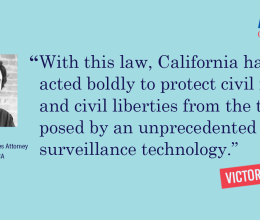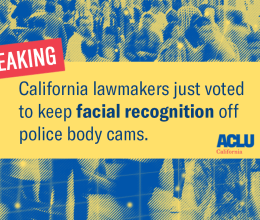Updated: On March 14, 2016, Lt. Jason Vickery, from the San Diego County Sheriff's Department, was asked in a KPBS Midday Edition interview if there were plans for public hearings to gather input from the entire San Diego community on the potential use of drones by the Sheriff’s Department. He responded:
At this point, not right now. That would be up to the Sheriff and once he makes his decision on whether we’re gonna go forward or not or who else he wants to reach out to, I’m sure he and his advisors will let me know and we’ll go forward that way.
The Sheriff is considering buying a powerful and invasive camera-toting drone and he’s leaving the public in the dark. Drones, especially with powerful cameras, are ripe for abuse and must never be able to fly under the public radar. Before this drone idea moves any further, there must be public meetings to ask and answer the right questions about powerful and invasive drones and whether they should be flying in our skies, peeking through our windows, and taking pictures and video of our families.
The San Diego Sheriff wants to purchase a drone, according to a press report. Before this idea moves any further, there must be a robust public debate to ask and answer the right questions about these potentially invasive devices and whether they should be used by law enforcement in San Diego County. Community members must have a voice in this important issue – government-owned drones should never be able to fly under the public’s radar.
Drones are a very powerful surveillance technology. Their small size and ability to be equipped with cameras and microphones makes drones capable of invading privacy and collecting information in new ways. We already know that without strong safeguards in place to protect community members, other types of surveillance technology have been used to spy on communities of color and target peaceful activists.
San Diego should learn from communities like San Jose and Alameda County that have faced very significant backlash related to drones and make sure that transparency, oversight, and accountability are built into the consideration process right from the start. The Sheriff and Board of Supervisors should make sure that there is a robust public debate, a thorough analysis of all potential costs and impact on community members, and that any decision safeguards civil rights and civil liberties. The ACLU of California has released, Making Smart Decisions About Surveillance, a guide for communities that provides step-by-step help with this process.
San Diego should also make sure that a consistent process is used whenever surveillance technology is considered. The ACLU guide also includes a model ordinance and toolkit to help. Communities like Oakland and Santa Clara County are already moving forward with similar efforts.
We will be watching to make sure that the people of San Diego County have a voice in this important issue.
By Christie Hill, Senior Policy Strategist, San Diego ACLU






